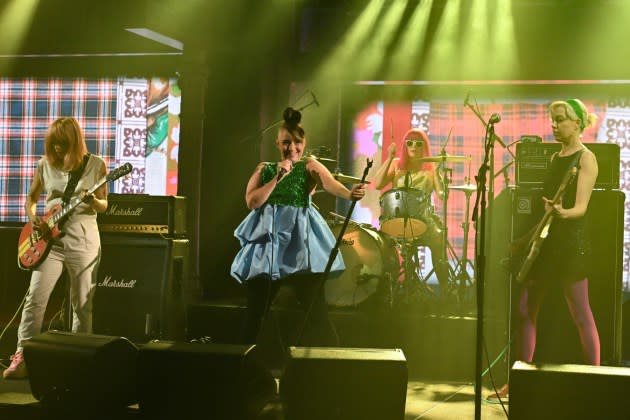Bikini Kill Make Long Overdue Late-Night Debut With ‘Rebel Girl’ on ‘Colbert’

At long last, the great Bikini Kill performed live on late-night television, taking the stage on The Late Show With Stephen Colbert on Monday, July 15.
The riot grrrl pioneers marked the occasion with a ground-shaking, speaker-rattling rendition of their classic 1993 single, “Rebel Girl.” “When she walks, the revolution’s coming/In her kiss, I taste the revolution,” Kathleen Hanna howled before launching into the chorus, “Rebel girl, rebel girl/Rebel girl you are the queen of my world!”
More from Rolling Stone
Late-Night Hosts React to Trump Rally Shooting: 'Grief for My Beautiful Country'
Jessica Pratt Makes Late-Night TV Debut With 'Life Is' on 'Colbert'
Billie Eilish Debuts 'The Greatest' Live With a Moving Performance
Bikini Kill’s long overdue late-night debut comes amidst a busy summer for the band. They’ve already played a bunch of shows in Mexico, South America, and Europe, and next month they’ll kick off a North American tour. The run starts Aug. 15 at the Wiltern in Los Angeles and wraps Sept. 11 at the Baltimore Soundstage in Baltimore.
Hanna also just completed a book tour in support of her memoir, Rebel Girl: My Life as a Feminist Punk, which was published in May. The book chronicled everything from her tumultuous childhood and punk epiphanies at college to her formative years at the heart of the riot grrrl movement and her various music endeavors, including Bikini Kill, the Julie Ruin, and Le Tigre. The book also featured stories about her friendships with various musicians (Kurt Cobain, Ian MacKaye, Joan Jett), her relationship with husband Adam Horovitz (a.k.a. Ad-Rock of the Beastie Boys), and her battle with Lyme disease.
In a recent interview with Rolling Stone, Hanna spoke about what compelled her to write the book. She began the process about five or six years ago during a very “transitional point” in her life, before Bikini Kill and Le Tigre were playing together again, and Hanna “wasn’t sure what [she] was going to do next.”
“I felt like I had to just write everything down that had happened, for myself, so I could move on,” she said. “I really needed to do that in my life, to make it into the next step. I needed to leave the Nineties behind, and I was finally ready to grapple with a lot of the punk purity stuff that happened back then. I needed to grapple with the good, the bad, and the ugly of living in the Northwest, and just being a feminist in a band.”
Best of Rolling Stone